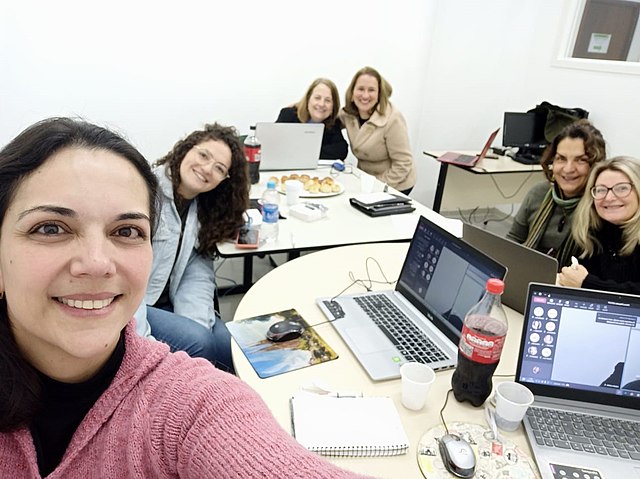
No matter the country, it can take years for those who suffer from hearing difficulties to seek care. Once they do, there is a low rate of uptake of recommended interventions, particularly for hearing aids (Wilson et al., 2017; WHO, 2017). Unaddressed hearing loss is a serious and costly problem around the world. This motivated the World Health Organization to organize the annual World Hearing Day (WHD) campaign which takes place every March 3rd. The goal of the campaign is “to raise awareness on how to prevent deafness and hearing loss and promote ear and hearing care across the world.”
When raising awareness of health issues, Wikimedia platforms come to mind as health-related articles on Wikipedia are read more than 150 million times per month (Heilman et al., 2011). Health information in Wikipedia can be a significant and trusted resource particularly in countries where access to care is scarce (Shafee et al., 2017; NYT, 2014). In 2022 FAPESP (São Paulo Research Foundation) funded a project by five Brazilian universities and a few international agencies to incorporate Wikipedia assignments focused on the promotion of hearing health. This project counts on the technical support from Wiki Movimento Brasil.
For World Hearing Day 2019, the International Society of Audiology and the National Institute for Occupational Safety and Health (NIOSH) took the lead in designing the online event Wiki4WorldHearingDay2019, to facilitate the improvement of Wikipedia content related to hearing, hearing health services, hearing testing, and preventive and treatment interventions. Several institutions joined in the event by either promoting it or contributing content to Wikipedia articles in English, Portuguese, French, Spanish, Italian, and Swedish. The Wikimedia outreach dashboard allows anyone to monitor contributions and reach, with great level of detail and accuracy. Tracking took place between January 21, 2019, and March 31, 2019, and showed that 74,000 words were contributed to 90 existing and seven new Wikipedia articles, and 21 images were donated to the open access repository WikiCommons. The articles received more than 2.8 million views during the 2-month period of the tracking (Morata, Chadha, 2019). A group of students from UFSC was responsible for 60% of the Portuguese-language edits during the Wiki4WorldHearingDay2019 campaign and more than 90% of the Portuguese-language edits during the first half of the Wiki4YearOfSound2020 campaign (Montilha et al, submitted).
Given the success of Wiki4WorldHearingDay2019, two other campaigns followed: Wiki4YearOfSound2020 and now Wiki4WorldHearingDay2023. In these platforms, one finds guidance and suggestions for different levels of involvement in the campaigns. The launch of the later campaign took place at the office of the World Health Organization in Geneva on November 18, with presentations from Thais Morata (User:Tmorata) and Daniel Mietchen (User:Daniel Mietchen). Participants from several countries including Chile, Zambia, England, India, Austria, Brazil, Uganda, Australia, Italy, Georgia, expressed interest in expanding content into Wikipedia in several languages. Tracking of the contributions has started and will continue until the end of March 2023 on the 2023 dashboard. The Blog authors and Shelly Chadha (Lead Officer, WHO Program for Prevention of Deafness and Hearing Loss) will officially close the online effort on March 2023 at the Encontro Internacional de Audiologia, which will take place in Florianopolis, Brazil.
The theme of the 2023 is Ear and hearing care for all! Let’s make it a reality and participants are expected to contribute content not only specific to hearing health but also to the topics of universality and equity in health care. We invite the Wikimedia community to join in the campaign. Small contributions count!
The breadth and accuracy of the Wikipedia coverage in medical science varies widely. We see campaigns like this as unique opportunities to make hearing content one of better-developed health areas within Wikipedia, while providing quality information to everyone in the world – where they are actually looking for it.
Let us know if you have any questions by sending a comment to this Blog.
References
Heilman JM, Kemmann E, Bonert M, et al. Wikipedia: a key tool for global public health promotion. J Med Internet Res. 2011;13(1):e14. Published 2011 Jan 31. doi:10.2196/jmir.1589
Montilha A, Morata TC, Flor, et al. The promotion of hearing health through Wikipedia campaigns: article quality assessment and other metrics. Health Informatics Journal, in press.
Morata, TC, Chadha, S. Make Quality Hearing Health Information Available to All. The Hearing Journal: May 2019 – Volume 72 – Issue 5 -p 6. doi: https://10.1097/01.HJ.0000559493.29061.35
New York Times, 2014. Wikipedia is emerging as trusted internet source for information on Ebola. October 26, 2014. Accessed April 4, 2019.
Shafee T, Masukume G, Kipersztok L, et al. Evolution of Wikipedia’s medical content: past, present and future. J Epidemiol Community Health 2017; 71:1122-1129.
WHO, Global costs of unaddressed hearing loss and cost-effectiveness of interventions. World Health Organization, Geneva (2017, accessed April 2, 2019.
Wilson BS, Tucci DL, Merson MH, O’Donoghue EL. Global hearing health care: new findings and perspectives. Lancet, 390 (2017), pp. 2503-2515.

Can you help us translate this article?
In order for this article to reach as many people as possible we would like your help. Can you translate this article to get the message out?
Start translation